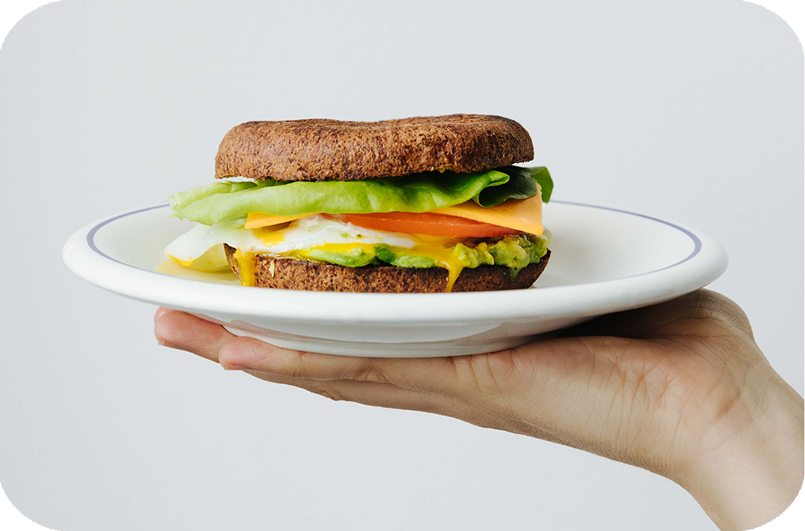
February 1, 2022 BY Unbun Foods
A Ketogenic Diet: The Beginners Guide
by Cait Mizzi, CFNP
Through-out history, our ancestors were able to adapt and survive times of famine or food scarcity by burning stored body fat as fuel. Under “normal” physiological conditions, we use glucose (from carbohydrates) as our primary energy source. However, if carbohydrates are sufficiently limited, we shift into a different metabolic process called ketosis. When the body transitions into this state, the liver begins to convert fatty acids into ketones for fuel. Humans have relied on the production of ketones for energy since the dawn of time, in fact, many babies are born in a state of ketosis until an adequate food supply becomes available. Now a days, we have an overly abundant supply of food to choose from, and so we might rarely or never call upon the metabolic pathway of ketosis.
Benefits of Ketosis
Since the early 1900’s, researchers in the field of medicine have been uncovering many of the potential benefits of ketosis through a properly formulated ketogenic diet. One of the earliest documented applications of this lifestyle was its ability to reduce the frequency and intensity of seizures in people with epilepsy. Since then, it has been shown that a ketogenic diet may help to improve and even prevent other conditions such as Alzheimer’s disease, heart disease, type 2 diabetes, polycystic ovarian syndrome, obesity, migraines, depression and cancer. Many people have turned to a ketogenic diet to improve body composition, improve sleep and mood, to enhance cognitive function, regulate blood sugar and prevent chronic disease.
Ketogenic Diet
We know that the goal of a properly constructed ketogenic diet is to produce ketones by burning fat instead of glucose for fuel. On a standard ketogenic diet, approximately 70-80% of your daily calories will come from fat, 20-30% of your daily calories will come from protein (0.8 grams of protein per pound of lean body mass), and only 5-10% of your daily calories will come from carbohydrates (20-50 grams, at most). These numbers vary from person to person, and it often takes a bit of trial and error to find your unique sweet spot.
What to Eat on a Ketogenic Diet
Include plenty of non-starchy vegetables such as leafy greens, cucumber, zucchini, asparagus, celery, broccoli, cauliflower and fermented vegetables like sauerkraut and kimchi. Use fresh and dried herbs and spices to season your food. Prioritize whole fats like avocado, olives, coconut, nuts and seeds and choose fatty cuts of meat like ribeye steak, chicken thighs and drumsticks, uncured bacon, wild caught fish and eggs. If tolerated, you may choose to include full-fat dairy in the form of grass-fed butter, ghee, hard and soft cheeses, heavy cream and kefir. Enjoy small amounts of low-sugar fruits like raspberries, blackberries, blueberries, lemon and lime.
What to Avoid or Limit on a Ketogenic Diet
Eliminate sugary foods and beverages. Reduce or eliminate processed and refined vegetable oils like canola, soy, safflower and sunflower. Limit starchy vegetables like potato and yam, high sugar fruits such as mango, banana, grapes and apple, beans and legumes. Eliminate whole and processed grains like oatmeal, rice, breads, pastas and pastries. You may choose to substitute some of these grain-based products with low-carb, keto-friendly alternatives like Unbread, Untortilla, Uncrust or any of the other Unbun products.
How to Know When You’re In Ketosis
For most people it can take 1-3 days to reach a varying state of ketosis. Once present, ketones are available in the blood, breath and urine. You can monitor your ketone levels through at-home testing with the use of urine strips, a breath meter or a glucometer. Urine strips are the most affordable way of testing, but the least accurate. Testing ketones in the blood with a finger prick glucometer is the most effective way, but also the most expensive. Testing is not essential, but is often helpful in the early days of a ketogenic lifestyle to help guide dietary choices and curious minds often want to know!
Even though there are many fantastic health benefits that come from adopting a ketogenic way of eating, it is not a perfect fit for all people, all of the time. If you aren’t sure if a ketogenic diet is right for you, seek the guidance of a licensed and credentialed nutritionist or dietician.
